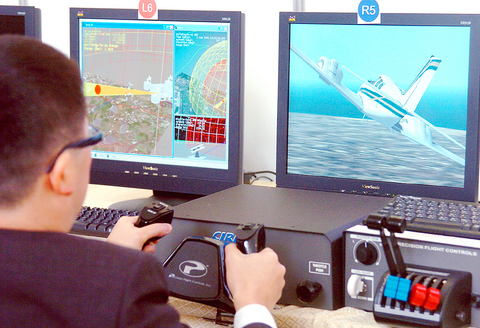Taiwan has never taken military support from other nations for granted, and the nation's defenses are designed to fight independently without relying on nations such as the US, a top Ministry of National Defense official said yesterday.
"The US has never promised to come to Taiwan's aid in the event of cross-strait hostilities. Nor has Taiwan anticipated such aid from the US, for we can never be sure if it would render us assistance," said General Hu Chen-pu (
Hu made the remarks during a press briefing held to show off the ministry's combat-maneuver training center. The event was also apparently aimed at promoting the ministry's arms procurement plan ahead of the legislative session that convenes on Feb. 21.

PHOTO: CHANG CHIA-MING, TAIPEI TIMES
In this regard, Hu said: "If possible, the government should bring the national defense budget to 3 percent of GDP and support the procurement of the three major weapons systems from the US by including them in the budget for fiscal year 2006."
The ministry would not rule out any options if there were a feasible substitute for the proposed package, Hu said, adding that "the major responsibility of the Ministry of National Defense is to conduct an assessment of what the nation's armed forces need to be equipped with. Besides, the ministry has carefully evaluated the type of weapons the nation needs and gained support from our allies."
According to the ministry's Integrated Assessment Office, China is expected to deploy more than 1,800 ballistic missiles by 2010. The total number of conventional and nuclear-powered submarines will also rise to 44 from 32 by 2008 before reaching 50 in 2015. The office believes that the cross-strait military balance will tilt in China's favor this year.
The office also said that the number of new Chinese warships reached 24 last year and that this will grow to 38 by 2015. China's navy is also expected to establish a fleet of aircraft carriers and claim naval and air supremacy in the Taiwan Strait by 2015.
Results of a computer analysis by the office suggested that the nation's armed forces need nine sets of Patriot Advanced Capability (PAC-3) missiles, 12 maritime- patrol aircraft and 10 submarines to deal with China's military threat.
To target weaknesses in China's People's Liberation Army and to maintain access to energy supplies, Taiwan must build its military strength to an extent that is capable of deterring invasion, ministry officials said.
In related news, China yesterday rejected a Pentagon report that singled out Beijing as the major power most likely to challenge the US' military supremacy and said it posed no threat to other countries.
The US' Quadrennial Defense Review released last week said China had the greatest potential to compete militarily with the US.
"The report interferes with China's internal affairs by groundlessly accusing China's normal national defense build-up," Chinese foreign ministry spokesman Kong Quan (孔泉) told a news conference.
"It also whips up a Chinese military threat and misleads public opinion," he said.
The review, outlining the Pentagon's strategy for meeting anticipated security threats in the next 20 years, said that the US would build new long-range weapons to counter potential rivals such as China.
also see story:
Ma pushes `status quo' in article

The CIA has a message for Chinese government officials worried about their place in Chinese President Xi Jinping’s (習近平) government: Come work with us. The agency released two Mandarin-language videos on social media on Thursday inviting disgruntled officials to contact the CIA. The recruitment videos posted on YouTube and X racked up more than 5 million views combined in their first day. The outreach comes as CIA Director John Ratcliffe has vowed to boost the agency’s use of intelligence from human sources and its focus on China, which has recently targeted US officials with its own espionage operations. The videos are “aimed at

STEADFAST FRIEND: The bills encourage increased Taiwan-US engagement and address China’s distortion of UN Resolution 2758 to isolate Taiwan internationally The Presidential Office yesterday thanked the US House of Representatives for unanimously passing two Taiwan-related bills highlighting its solid support for Taiwan’s democracy and global participation, and for deepening bilateral relations. One of the bills, the Taiwan Assurance Implementation Act, requires the US Department of State to periodically review its guidelines for engagement with Taiwan, and report to the US Congress on the guidelines and plans to lift self-imposed limitations on US-Taiwan engagement. The other bill is the Taiwan International Solidarity Act, which clarifies that UN Resolution 2758 does not address the issue of the representation of Taiwan or its people in

US Indo-Pacific Commander Admiral Samuel Paparo on Friday expressed concern over the rate at which China is diversifying its military exercises, the Financial Times (FT) reported on Saturday. “The rates of change on the depth and breadth of their exercises is the one non-linear effect that I’ve seen in the last year that wakes me up at night or keeps me up at night,” Paparo was quoted by FT as saying while attending the annual Sedona Forum at the McCain Institute in Arizona. Paparo also expressed concern over the speed with which China was expanding its military. While the US

SHIFT: Taiwan’s better-than-expected first-quarter GDP and signs of weakness in the US have driven global capital back to emerging markets, the central bank head said The central bank yesterday blamed market speculation for the steep rise in the local currency, and urged exporters and financial institutions to stay calm and stop panic sell-offs to avoid hurting their own profitability. The nation’s top monetary policymaker said that it would step in, if necessary, to maintain order and stability in the foreign exchange market. The remarks came as the NT dollar yesterday closed up NT$0.919 to NT$30.145 against the US dollar in Taipei trading, after rising as high as NT$29.59 in intraday trading. The local currency has surged 5.85 percent against the greenback over the past two sessions, central